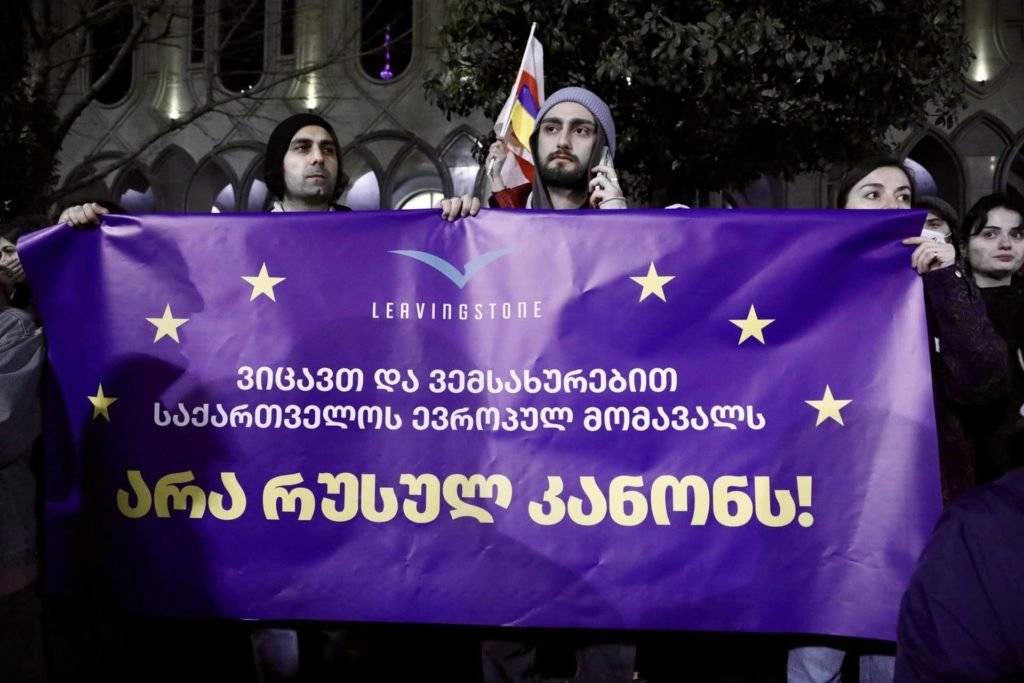Gen-Z: Getting Closer to the West
Music, cinema, sport, literature: the Georgian Gen-Z shows a cultural affinity with the West that is significant for a generation struggling to break free from Russian influence – some through music and culture, but also by leaving the country.
Author: Hugo Laulan is a journalist. He interned at Civil.ge
From 21 June to 8 July, Georgia co-hosted the European Under-21 Football Championship with Romania. It was an opportunity for Georgia to gain visibility across Europe, helped by the great run of the young Georgian team, which reached the quarterfinals.
During the opening game at the Boris Paichadze Arena in Tbilisi, the opening ceremony featured young dancers. The opening song for the ceremony carried a telling title: They Don’t Care About Us by Michael Jackson, as if to say that this was the first time, Georgia’s new generation had been noticed, at least by some European countries.
Music for freedom
The title song is significant and illustrative of Georgia’s positioning in relation to Europe. But Tbilisi’s music scene itself has taken on a whole new dimension in this sense, helping to put Georgia on the European map. The Georgian capital’s reputation in the European Union has been growing thanks to its vibrant music scene, festivals, increasingly influential nightclubs, and atypical places where music plays a major role.
The Tbilisi Open Air Festival in June attracted thousands of festival-goers who came to hear a host of local artists alongside the headliners from the West – such as British singer Tom Odell, Icelandic rock band Kaleo, and Berlin electro group Moderat.

The electronic music scene is also making Tbilisi the new trend in Europe. Numerous DJs perform in the city’s various clubs, from the most famous Bassiani to the more underground venues of the capital’s nightlife.
Always hungry for new destinations, some internet media even started to describe Tbilisi as “the new Berlin.” Well-known Tbilisi live performer Zurab Babunashvili, known by his stage name Zesknel, explains that “music is helping to develop Georgia’s image in Europe,”, which he believes says a lot about the political situation in the country today.
“Young people feel free in clubs,” he says, “You can do whatever you want and feel safe, whatever your sexual orientation, and it is paradoxical to feel free when you are in a closed place, in the dark […] It is symptomatic of how people may not feel free outside if they feel free in clubs.” Nightlife is a breath of freedom for young Georgians, including LGBT+ minorities.

Nevertheless, Zurab prefers to temper his comments and says Tbilisi’s image as the ‘new Berlin’ is somewhat exaggerated. “Tbilisi is not like Berlin in the 1990s,” he says, “even though it has its own identity. Places like the Bassiani club or the famous Fabrika (the hip cultural center in a historic part of Tbilisi, Georgia, located in an old industrial building) are part of Tbilisi’s identity, but cannot represent the whole city, much less the whole country.”
The risk, says Zurab, is that it does not reflect the everyday reality of the country and that some visitors to Tbilisi, with only the image of Fabrika and Bassiani in their minds, may misinterpret the context in which Georgians live.
‘Flight from the USSR’
Flight from the USSR, Dato Turashvili’s novel, tells the story of idealistic students living in the Georgian Soviet Socialist Republic in the 1980s who want only one thing: to escape.
On 18 November 1983, seven students hijacked an airliner on its way to Turkey, but the experience turned tragic when a Soviet special forces unit ambushed the returning plane, killing eight people. The surviving hijackers were subsequently tried and executed.
With more than 100,000 copies sold in 15 years, this book is an unlikely bestseller more than fifteen years after its publication. Why does the Gen-Z feel attracted to it?
According to Tina Mamulashvili, director of Sulakauri Publishing, which published Flight from the USSR, this success ‘is not difficult to explain because […] it is really symbolic of the idea of freedom, of non-conformism, and it is also written in a really popular way, not a kind of research… It can help the younger generation to understand how difficult the system was.”

She says the novel sells approximately 7 thousand copies per year when the normal sales for a successful novel stand between 2,000 and 3,000.
It is hard to avoid making a parallel between this literary success and the country’s current situation. Mamulashvili says, “At the moment, fortunately, we’re not living in the Soviet Union, but people are fighting for the idea of freedom because we don’t want Georgia to be part of Russia or under the influence of Russia.”
In a way, the story reflects the situation of many young Georgians today: the protagonists were also very attracted to Western values and ideas. The book also shows very well that the idea of freedom and liberty comes from the West, not from Russia.
With international bestsellers increasingly being translated and finding their way into Georgian libraries, the Georgian authors who promote Western values also make a dent. The latest bestseller, “Blackbird Blackbird Blackberry”, a feminist novel by Tamta Melashvili, has sold over 10,000 copies. The movie based on the novel was screened at the recent Cannes Film Festival and is racking up awards at international festivals.
Government out to cajole Gen Z
The cultural orientation of the Gen-Z is highly Westernized and recently also politicized – they have played an important – some say crucial – role in forcing the government to overturn the law that would have severely restricted civic freedoms.
The Georgian ruling party is taking note and trying to get young people on board – or at least out of the streets. In addition to co-hosting this year’s European Under-21 Football Championship, a UEFA competition that means a lot to Georgian youth, the Georgian government is busy organizing concerts by famous musical performers, paid for with money from the state budget, to boost its image among young people: Imagine Dragons on 31 August, Bruno Mars on 1 October and The Killers, the first to perform, on 15 August.
Bus stops, marshrutkas, buildings – walking around Tbilisi without seeing a poster advertising these concerts is hard.
Babunashvili says the government’s strategy to cajole the youths to support its policies this way is ineffective. “I’m not against the idea of bringing Imagine Dragons, and I love The Killers too. But the fact that the Georgian government is using taxpayers’ money to bring them may not be a problem elsewhere, but I think it is a problem here. It will not change anything. People will go to the concert, but not to the government.”
And it is easy to make a gaffe to feed into mistrust towards the government. During The Killers’ performance on August 15, Brandon Flowers, the band’s frontman, invited a Russian fan onto the stage and then addressed his Georgian fans, saying: “We are all brothers,” prompting a section of the audience to walk out in protest. The band apologized on their social networks the next day, saying it was “never their intention to offend anyone.” Some of the youths said the incident was staged by the government, which is seen as appeasing Russia. But even though this notion seems far-fetched, its very existence is telling.
Yet, even though the ruling government’s efforts to appease the younger generation may not have paid off, its policies are working another way. Many young people are “voting with their feet” and leaving the country in large numbers for a better life and prospects.
In 2022 alone, around 125,000 citizens emigrated from Georgia, most of them young, productive, and educated.

